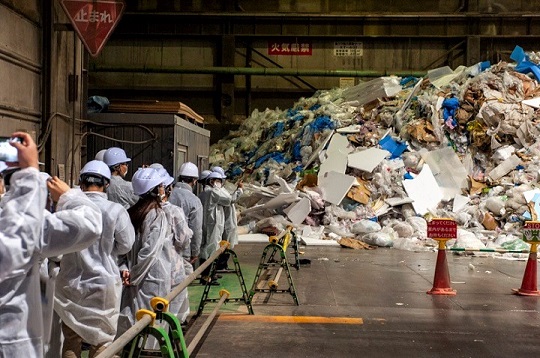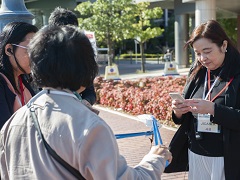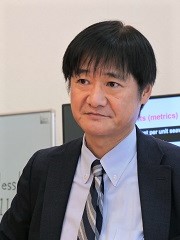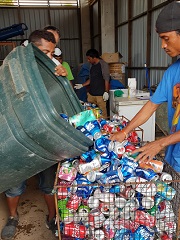- Home
- News & Features
- News
- FY2019
- Tackling the issues of marine plastic waste: Collaborating with developing countries to implement various initiatives
News
March 17, 2020
Tackling the issues of marine plastic waste: Collaborating with developing countries to implement various initiatives
The problem of marine plastic waste has come under scrutiny around the world in recent years. JICA invited persons dealing with the issue of marine plastic waste in developing countries to participate in a program on Japanese initiatives to tackle the problem. Efforts are underway to take countermeasures against relevant issues in developing countries by utilizing multiple ODA instruments, such as Technical Cooperation and Private Sector Partnership.
 Participants visiting a company facility where plastic waste is recycled into fuel (GUUN Co., Ltd.: Yokohama City)
Participants visiting a company facility where plastic waste is recycled into fuel (GUUN Co., Ltd.: Yokohama City)
Waste management officials invited from four East Asian countries
Mr. Chaiyo Juisiri, a participant in the JICA program and a member of Pollution Control Department of the Ministry of Natural Resources and Environment in Thailand, had this to say. “Formulating countermeasures against marine plastic waste is not a problem which a single country can solve. I feel that participation in this program was particularly significant, as it helped us find allies in neighboring countries with the same goal of tackling marine plastic waste.”
 Trying the garbage cleanup social media app PIRIKA. Participants were impressed with new tools such as coordination with a garbage disposal survey system
Trying the garbage cleanup social media app PIRIKA. Participants were impressed with new tools such as coordination with a garbage disposal survey system
During the program conducted by JICA in November 2019, 12 persons in charge of handling marine plastic waste were invited from Thailand, Indonesia, the Philippines, and Vietnam. The program allowed participants learn about various initiatives in Japan, through a lecture by professor ISOBE Atsuhiko, who studies marine plastic pollution at Kyushu University, taking part in garbage cleanup in Yokohama City using the social media app PIRIKA, as well as visit to the GUUN Co., Ltd. recycling facilities where plastic is being turned into fuel.
While on a tour of the Tobuki Clean Center (Hachioji, Tokyo), Ms. Raquel B. Echague, Board of Investments of the Department of Trade and Industry in the Philippines, said, “I am impressed not just with the plastic refuse processing and recycling technologies, but also with the fact that everyone shares the same awareness of reducing plastic on the ground. The relevant departments in the Philippines are currently discussing an action plan on how to tackle the problem of marine plastic waste, so I think these examples of initiatives in Japan and other information I learned during the program will be of use.”
The main cause of marine plastic waste is improper management of plastic waste on land, which eventually flows into the coast or to the ocean. It damages the marine environment including the ecosystem, adversely affecting the tourism and fishing industries, and is a cause for concern in worsening living environments along the coast. Plastic that ends up in the ocean continues to accumulate without degrading for hundreds or even thousands of years. For this reason, worldwide countermeasures are needed, which are particularly urgent in developing countries which do not have sufficient experience with environmental countermeasures.
International joint research in reducing marine plastic waste
“Formation of a Center of Excellence for Marine Plastic Pollution Studies in the Southeast Asian Seas,” a new project of the Science and Technology Research Partnership for Sustainable Development (SATREPS), is scheduled to begin in April 2020, as an international joint research initiative to reduce marine plastic waste in the ASEAN region. The project will be jointly implemented by researchers from Japan, one of the leading countries of marine plastic research, and Thailand, a country facing severe urban waste problems that come with economic growth. It aims to establish a research base in Thailand to serve as a model for ASEAN countries, with the goal of formulating an action plan for reducing marine plastic waste for submission to the Thai governmental organization.
Professor Isobe, who represents the Japanese research team in this project, had the following to say about the future of marine plastic waste.
 Kyushu University professor ISOBE Atsuhiko, representative Japan researcher of SATREPS project
Kyushu University professor ISOBE Atsuhiko, representative Japan researcher of SATREPS project
“It is estimated that much of marine plastic waste comes from developing countries, mainly in the ASEAN region. For this very reason, it is important to tackle the problem not just on the efforts of developed countries such as Japan, but as an international society on the whole, as this is a problem on a global scale. Plastic is deeply ingrained in our everyday lives, making it difficult to reduce. We must conduct surveys and research to help us understand the current situation, formulate a medium to long-term plan based on scientific evidence, then make efforts to reduce plastic use.”
Moving forward with appropriate waste management
JICA also provides support for improvement of waste management in developing countries.
A project to promote the use of biodegradable plastic shopping bags will be launched in Kenya with the cooperation of Kaneka Corporation, headquartered in Japan. With a law already in place in Kenya that prohibits general petroleum-derived plastic bags, the project aims to create a system and support technologies for producing and popularizing bags that are derived from plant-based ingredients and thus are degradable in soil under natural conditions. (This project is called “Collaboration Program with the Private Sector for Disseminating Japanese Technology for Biodegradable Shopping Bags made of PHBH compounds in Kenya.”)
 Container Deposit System in Majuro
Container Deposit System in Majuro
Also, JICA’s support in Majuro, the capital of the Marshall Islands in the Pacific region, helped introduce a Container Deposit System which started in 2018. A deposit is collected when containers such as plastic bottles are imported, and the product is then sold to the consumer at a price which includes the additional deposit. When consumers bring used containers to a designated redemption center, they can receive part of the deposit. After this system was introduced, collection of empty containers began to spread in Majuro. By reducing illegal disposal in the city, amount of inflow of plastic waste to the ocean is expected to decrease.
There are urgent needs for improvement of waste management in developing countries, and JICA engages in such efforts to meet the needs of each locale, supporting not only addressing marine plastic waste measures, but also providing necessary support including waste management with a comprehensive perspectives.
- About JICA
- News & Features
- Countries & Regions
- Our Work
- Thematic Issues
- Types of Assistance
- Partnerships with Other Development Partners
- Climate Change / Environmental and Social Considerations
- Evaluations
- Compliance and Anti-corruption
- Science and Technology Cooperation on Global Issues
- Research
- JICA Development Studies Program / JICA Chair
- Support for the Acceptance of Foreign HRs / Multicultural and Inclusive Community
- Publications
- Investor Relations





